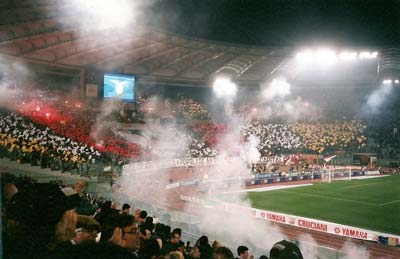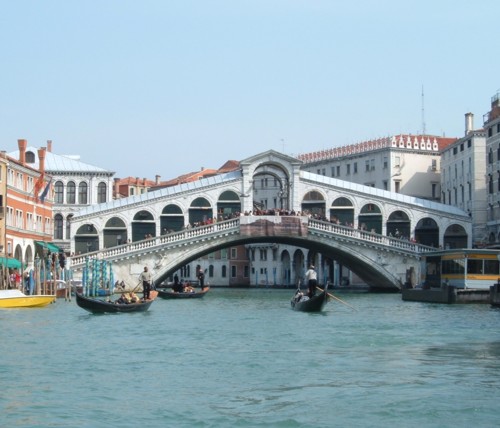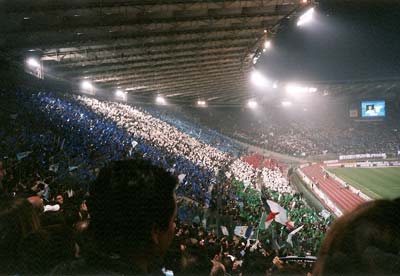

This page runs through some of the practicalities of planning a trip to see an Italian football match. It will help you plan how to get to Italy, how to get about when you are there, how to book a hotel online, and provide ticket and matchday advice.
The full fixtures for the Italian season are announced before the start of the season, and although there are always going to be some changes, it is quite easy to plan your visit well in advance providing you allow for the match to be moved forward 24 hours or back to Sunday evening.
Nowadays it can be very cheap to fly to Italy from the UK. Several budget 'no-frills' airlines fly to various Italian cities (many of which have football teams) from airports around the UK. Thanks to the success of these companies, the cost of flying with more traditional airlines like British Airways has dropped as well so it is always worth having a look at their flights as well.
Ryanair fly from Stansted to a large number of Italian airports, and also operate lots of flights from other UK and Ireland airports to destinations throughout Italy.
Easyjet also serve lots of Italian airports, including a few convenient ones which Ryanair don't cover, like Venice Marco Polo (the nearest airport to Venice) and Naples.
Thomson Flights currently fly to a handful of Italian destinations from various UK airports, including Verona, Naples, Pisa and Catania.
Flybe operate flights from Southampton to Verona and from Manchester and Birmingham to Milan.
Flybmi offer flights to Milan, Rome and Venice from a handful airports in the UK.
AirBerlin are a German based airline who also run cheap flights from the UK to some Italian cities.

Accommodation is generally plentiful in Italy and your options range from hostels and humble B&Bs to swanky 5-star hotels. All tastes and budgets are catered for and a selection of the best hotels are featured and reviewed on our sister website Italy Heaven.
Trains are an efficient and cheap way to get about Italy. You can look up timetables and reserve tickets online at www.trenitalia.com. The rail service, Ferrovie dello Stato (FS), operates many different types of train. You pay per mile, and each type of train has a different price. It's worth comparing a few options as slower trains can be much cheaper. Sometimes for a journey that is 20 minutes longer you can halve your fare - but do be sure to have the right ticket for the train you get on or you'll run the risk of a hefty fine.
We've always found a good way to buy tickets is from the automatic machines in stations. These are often plentiful, efficient, multi-lingual, take credit cards and are much better than waiting in a queue to speak to a surly assistant behind a glass window.
The main problem associated with travelling in Italy is the likeliood of strikes. These happen at irregular intervals, generally taking place at weekends, from Saturday evening until Sunday evening. Some trains may still run, but you can't rely on being able to make your journey. When a strike - sciopero - is scheduled, details should be announced on the FS website (see above). Bus services also connect cities, although they can be hard to find, so try to plan in advance.
Important note : always validate your ticket by stamping it in the machines provided on platforms. Inspectors can be very hard on anyone travelling without valid tickets, and they don't always take pity on bewildered tourists (it's always worth a try though). If you absolutely can't find a machine that works - this goes for buses as well - try writing the date and time on the ticket yourself. This shows your good intentions.
The process for buying tickets varies from club to club and can change year by year. In most cases tickets can be bought online through a link on the club website (usually in the 'biglietti' or 'stadio' section). Additionally, many clubs sell tickets through shops or bars in their home town, these are normally listed on the club website.
Tickets are not always sold on the day of the game so try to book your tickets well in advance. Availability is rarely an issue except for matches involving the big clubs but if you haven't booked before arriving in the country, try to do so as soon as possible to avoid disappointment. Hotels can be useful sources of information on the easiset way to do so. It is also worth checking or asking about concessions as many clubs offer reduced rates for women, children and the elderly.
Important note : if you have bought your ticket in advance or plan to at the stadium, every member of your party will need to provide photographic ID to gain entry (a passport is fine for this).

On each club page, we do our best to provide directions to the stadium; but on matchdays there is always plenty of public transport laid on for fans, usually from the city's main station. Once in the stadium, you can usually buy a basic range of panini or pizza slices and drinks. Alcohol is not really part of a matchday experience as it is in Britain and you will be much more likely to see the locals drinking coffee to keep themselves warm.
The majority of fans occupy the ends (curva) of the ground - one end will be the hub of the home support, the other usually sparsely populated with the few away fans that have travelled. For the best atmosphere try and locate yourself near to the home end. Actually joining the home fans in the curva (where everyone stands up) can be exhilarating but can also be a little intimidating, especially for females or if you don't speak much Italian. There is more information on the passion and culture of Italian football on the About Italian Football page.